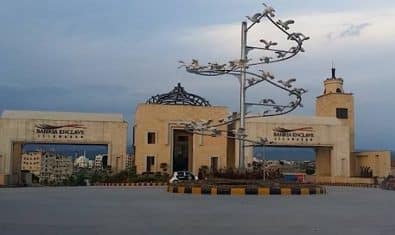The Competition Commission of Pakistan (CCP) has strongly recommended the government remove trade barriers on imports/exports of commodities, encourage agriculture e-commerce, and review subsidies on certain crops including urea fertilizer by allowing the market forces to play their role.
The CCP has reviewed 10 essential commodities to identify and address market distortions for farmers. The CCP report available with ProPakistani revealed that the government also supports agriculture through subsidies on urea fertilizer, water, and energy.
These subsidies favor urea fertilizer-intensive crop production over pulse production, which requires relatively less urea fertilizer. Therefore, the government needs to review these subsidies on certain crops and allow the market forces to play their role.
The current study outlines the underlying causes of the price hikes which include inappropriate policies and regulations that distort markets, inhibit competition and discourage private investment, as well as limited and poorly implemented efforts for research, innovation, and technology dissemination.
On the production side, insufficient productivity, market distortions, and limitations of trade result in market rigidities that push prices. Subsidies provided by the government on urea fertilizer, water, and energy to support agriculture distort the market and encourage more urea fertilizer-intensive crops.
The CCP review of these commodities has identified multiple issues that hinder the efficiency and competition in these commodities. The government policy focus on major three crops (wheat, rice, and sugarcane) is impeding the growth of other crops.
Lack of R&D in high-yield varieties and under-developed seed dissemination mechanisms is resulting in lower yield and inefficient use of resources. Limited access to finance for farmers growing crops other than cereals acts as a disincentive to grow other crops, leading to a non-level playing field for all crops.
Access to markets
Access to agricultural markets and asymmetric information on the market situation often deprive farmers of their optimal return and incur losses to their produce. High government involvement in the storage of grain has resulted in crowding out of the private sector from the storage industry. Furthermore, the storage capacity is less than the requirement of the country which results in losses of crops.
Therefore, the government shall encourage and incentivize the private sector to invest in establishing silos, warehouses, and cold storage facilities. Similarly, the use of water for growing crops is inefficient which results in the wastage of scarce resources. There is a need to introduce water-efficient techniques in the agriculture sector of Pakistan.
Trade barriers
Trade barriers act as barriers to entry for traders to enter international markets of agricultural products. This also results in inefficient allocation of resources and promotes competitive crops. Promoting contract farming and vertical integration in the agriculture sector can promote efficiency, and efficient allocation of resources, and achieve economies of scale. The structure of agriculture produce markets is also obsolete and requires a complete overhaul.
Storage issues
The CCP report disclosed that Pakistan is facing grain storage problems at a large scale throughout the country, due to either traditional methods of seed storage or a shortage of commercial grain storage or their management. The shortage of grain storage facilities results in huge post-harvest losses that range from 15 percent to 35 percent and affects national agricultural output.
Similarly, in case of excess production in crops such as onion, tomato, and potato, farmers do not have storage facilities and are compelled to sell their produce at a low price to the village dealers. In the worst-case scenario, they end up wasting the whole crop due to higher charges incurred for transporting the crop to mandis.
Contract farming
The report further disclosed that the agriculture sector can be modernized through Contract farming. Through Contract Farming, farmers are linked to markets by either formal or informal contracts as a result of some type of arrangement with a buyer who adds value to the raw commodity in some way (processing, storage, and marketing). It results in better yield through the use of new and improved seeds, the skill development of farmers, and boosting of exports.
Regulatory duties
There is an active 35 percent regulatory duty on the export of pulses under S.R.O.049(I)/2006. The RD is intended to meet the local demand for pulses and to maintain competitive prices. However, this duty has discouraged farmers to cultivate pulses at the same time Pakistan has higher domestic demand, resulting in spending scarce foreign exchange on pulse import. It is expected that the removal of the RD will not only increase domestic production but it will also result in lower domestic prices, CCP said.
The government implements a procurement price for wheat, which discourages pulse production by making pulses relatively less profitable and riskier to produce compared with wheat. Therefore, the government needs to shift the policy focus towards pulses that have high domestic demand and their import consumes scarce foreign reserves.
The report said that the governments in the developing world often intervene in agriculture markets to ensure sustainable farm incomes and provision of essential food items to its growing population. In Pakistan, much of the policy focus has been on wheat, rice, and sugarcane whereas other crops have not remained in the policy limelight to increase domestic production. Hence, the production of other crops has not increased comparably.
Non-availability of quality seeds
On the supply side, the seed corporations and companies’ focus has remained on the production and marketing of seeds for cereals and cotton. The public sector also has not shown much interest in increasing the production of crops by producing and distributing quality seeds. Further, there has been a lack of institutional support to the private sector in quality seed production, supply, and storage.
The Agriculture Produce Market (APM) is the place where the sellers of agricultural commodities interact with the buyers to determine/establish the market price. The APM is a physical market where either the farmer or a middleman (who can be a village Biopari/Commission Agent/Pre-Harvest Contractor) brings the agricultural produce for auction to another middleman (Arhti/auctioneer) 210 who sells it to the wholesaler (Pharia), who then sells it to the retailer or the consumer.
The total number of APMs operating in Pakistan including both public and private (grain and fruit & vegetables) is 345. The increase in the number of these markets over decades has been very slow resulting in multiple issues of inefficiency, weak monitoring by the Market Committees (MCs), and exploitation of market intermediaries.
Need for R&D
The report revealed that low yield is a common issue among all crops in Pakistan. The major reason for low yield is the lack of R&D in high-yield varieties and the underdeveloped seed dissemination mechanisms. Over 80% of farmers use their own seeds for different crops and only 2-5 percent use certified seeds of recommended varieties that are high yield and climate resilient, resulting in lower yield.
Farmers lack information and training on growing different crops. They do not distinguish between different seed varieties and prefer the varieties they traditionally grow.
Unavailability of farm machinery
The unavailability of farm machinery is also a major obstacle in increasing the area and production of various crops in Pakistan. In addition, the application of pesticides, insecticides, and harvesting is done through manual means, all factoring into low yield per area.
Export/import bans
The report added that protectionism through export/import ban and tariffs act as barriers to entry for traders to reach international markets. However, due to protection, consumers have a very limited choice with respect to the quantity, quality, and type of product that is otherwise available to them without this protection.
The protection of an industry may actually end up costing the government a significant amount of money and financial resources in order to protect it. This may actually promote inefficiencies in the industry and provide no incentive to make efficient, intelligent, long-term investments to enhance industry efficiency.
In Pakistan, two major agricultural commodities, wheat, and sugar are frequently protected from international competition and the domestic wheat and sugar market has thus remained priced well above the international market.
These markets are protected from imports by a tariff of 60percent and 40 percent respectively, which is abolished in times of shortage. This protects the local industry and provides no incentive to invest in higher-yield/sucrose varieties.
Limited outreach of ZTBL
Not only the outreach of ZTBL remains limited but the farmers who are engaged in the production of crops other than cereals also have limited access to agricultural loans from ZTBL and other commercial banks. The farmers rely on informal modes of financing and depend on the village dealer for loans and seeds. This acts as a disincentive to grow crops other than cereals, the report said.
Agri E-commerce
The CCP recommended that there are multiple benefits of agriculture e-commerce, it reduces the wastage of farm produce and brings in market efficiency. The online platforms provide farmers with an alternative market and the farmers neither have to accept low prices offered by middlemen nor have to search for a last-minute buyer which increases the risk of postharvest losses.
The online platforms result in fair incomes for the farmers as they are offered better value for their products compared to what an average middleman pays. Through digital/mobile money solutions on these agri-e-commerce platforms, farmers can build their transaction history which can be used to show their creditworthiness to financial institutions or financial service providers, thus improving their access to credit. In Indonesia, crowdfunding platforms are used by individuals to invest in farmers.
In Pakistan, mobile penetration is high and teledensity stands at 88.6 percent (July 2022). The share of smartphone users is higher (53.8 percent) than basic phone users (46.2 percent)224 and 88 percent of the population have access to internet/broadband services With access to the internet and mobile technology, the agriculture eCommerce platforms have great potential for Pakistani farmers as it can mitigate the supply chain issues in accessing markets by the farmers.
The government needs to focus on the development of an Agri e-commerce ecosystem which would require the government ministries (federal and provincial) and the regulators (PTA, SBP) to establish an enabling regulatory environment to govern the agriculture e-commerce. In addition, the government may also provide support services such as providing information to the farmers through these e-commerce platforms and holding events to raise farmer awareness of Agri e-commerce opportunities, it added.






















How this propakistani
What is this propakistani ye kiya cheez hy what is this